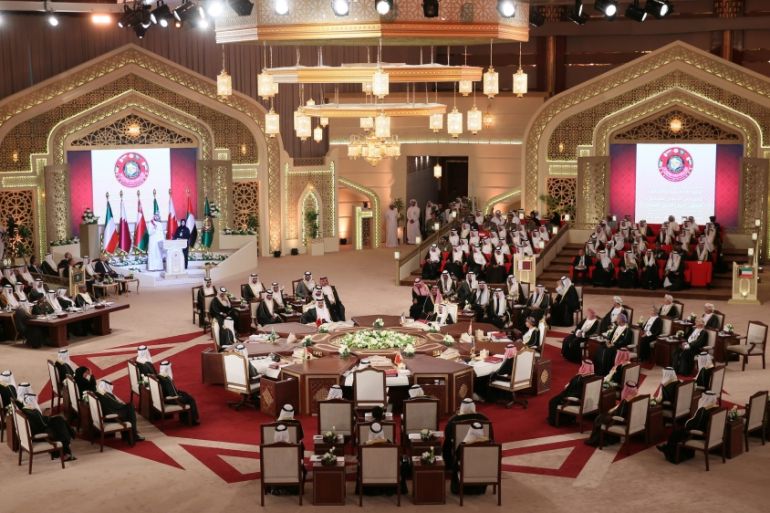Analysis: GCC ‘ambiguous’ about Russia in Syria
Although GCC states voiced opposition to Russia’s intervention in Syria, they seek to build a new alliance with it.

As Vienna prepares to host a second round of talks between Russia, the United States and other major powers to discuss the Syrian crisis, there is a growing conviction among a number of Gulf state policymakers that the solution to the region’s problems, particularly Syria, lies in Riyadh and Tehran.
The first round of talks on October 30 resulted in calls for a nationwide ceasefire, but divisions remain between countries backing opposing sides over how to resolve the conflict.
Keep reading
list of 4 itemsQatar emir condemns ‘genocide’ in Gaza, urges ceasefire at GCC summit
‘Enduring commitment’: Key takeaways from US-GCC joint statement
Analysis: Efforts to end Assad isolation gather speed after quake
On Wednesday, Tehran, a key player in the Syrian crisis, said it had yet to decide whether it would attend the Vienna talks, due to start on Saturday.
Undeniably, Iran has a role to play in the regional crises, particularly in Iraq, Yemen, Syria, and Lebanon – but so do other Gulf states.
This should explain Qatar’s proposal, presented by its emir, Sheikh Tamim bin Hamad Al Thani, at the UN General Assembly in September, to host an Arab-Iranian dialogue aimed at helping to resolve outstanding issues that divide the region – most importantly the Syrian crisis.
RELATED: What Gulf countries expect from Obama
For many Middle East observers, it is evident that the states supporting the Syrian revolution and seeking the removal of President Bashar al-Assad, which include Turkey, Saudi Arabia, and Qatar, will not allow Russia’s latest military intervention to change the rules of the game by weakening Syria’s armed moderate opposition, whom they sponsor.
These states have voiced opposition to Russia’s air strikes against targets associated with the Syrian opposition, particularly given that Moscow’s stated goal was to fight terrorism and the Islamic State of Iraq and the Levant specifically.
|
Such discord between the main international actors on the future of the Syrian conflict makes the prospects for a resolution more remote.
|
In this way, Russia’s intervention has turned the Syrian conflict into a global proxy war.
To understand the level of involvement of Saudi Arabia and the Gulf states in the Syrian conflict, one must take into consideration Saudi’s involvement in the Yemen war.
It is possible that regional backers of the Syrian revolution could begin to supply the type of weapons that could help tilt the balance amid Russian air strikes.
Equally possible is that Moscow could begin to supply the Houthi rebels in Yemen and the military supporters of deposed President Ali Abdullah Saleh with the weapons they need to fight the Saudi-led coalition.
Such a scenario rests on the assumption that supremacy in these two Middle Eastern conflict zones is defined by air power: If one side – Saudi Arabia or Russia – seeks to thwart the other, it can do so by providing weapons to the party it sponsors in a conflict – Syria or Yemen – in which the opposite side is actively using air power.
Given Saudi’s pragmatism, however, it is unlikely to seek to escalate military tensions at the moment to avoid opening another war front. Rather, Saudi has long been a champion of a negotiated political settlement to the Syrian crisis, provided that Assad has no role in the country’s future.
Infographic: GCC military spending spree
|
|
The Russian intervention in Syria comes at a time when the relationship between the US and the Gulf Cooperation Council states is suffering a crisis of confidence, amid the fallout over the Iran nuclear deal.
There is now a growing sense in the GCC region that the Obama administration has resolved to strengthen Iran at their expense.
In turn, the GCC states have sought to improve their relations with both Russia and Europe.
The rapprochement with Russia and some European capitals, particularly Paris and London, has been mirrored by the official visit of the Saudi defence minister, Crown Prince Mohammed bin Salman, and the crown prince of Abu Dhabi Sheikh Mohammed bin Zayed to Russia. Last summer, Qatar bought 24 military aircrafts from France and the French president was invited to attend a meeting of GCC leaders in Riyadh last June.

While this does not mean that the Gulf is abandoning a long-term strategic partnership with the US, it does suggest that the six GCC member states are seeking to build new alliances.
The ambiguity of the reactions from other Arab states as well – many of which refused to approve a joint declaration opposing Russian intervention in Syria – is itself further evidence of a divide within the Arab world over Russia’s role in Syria.
Such discord between the main international actors on the future of the Syrian conflict makes the prospects for a resolution more remote.
Jamal Abdullah is a researcher at the Gulf Studies Unit with the Al Jazeera Centre for Studies.